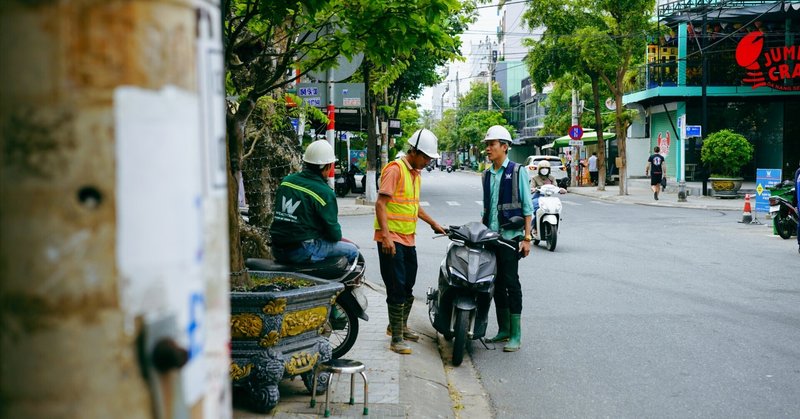
Duyくんと英語と社会主義 Conversation about English and Socialism with Duy
今週も引き続きダナンにいます。
I am still in Danang this week.
長期滞在の魅力は、なんといっても現地でローカルの友達を作ることができるでしょう。 今の時代はSNSやらマッチングアプリやら、MeetUpやら、手段は多くあります。僕は旅の魅力はその国を深く知ることにあるように思います。たとえ「観光客」として訪れたとしても、多くの場合、観光地を回り、観光客むけのレストランで食事をして終わってしまうことがあるのではないでしょうか。しかしながら、そこで見えるのは、その国の表層であり、文化や価値観といった、深層までは辿り着くことができません。やはり、ローカルの友達を作ることが一番のように思います。
The charm of a long stay is undoubtedly the ability to make local friends. Nowadays, there are many ways to do this, such as social media, dating apps, and MeetUp. I believe the charm of traveling lies in deeply understanding the country. Even if you visit as a 'tourist', you often end up just visiting tourist spots and eating at restaurants for tourists, which only shows the surface of the country. To truly understand its culture and values, making local friends seems to be the best approach.


今回出会ったのは、Duyくん。彼は僕より2歳年下の24歳で、現在大学でメディアプロダクションについて勉強しているそう。元々10歳くらいまでダナンに住んでおり、今はホーチミンに住んでいるとのこと。僕と会った次の日からは、山岳民族の村に出向き、映画の上映会をする活動をすると話していました。たぶんトータルで5〜6時間話した記憶があるのだけれども、その中でも印象に残ったことを少しまとめてみたいと思います。
This time, I met a guy named Duy. He's two years younger than me, 24, and is currently studying media production at university. He originally lived in Danang until about the age of 10 and now resides in Ho Chi Minh City. He told me that he would be going to a mountainous village to hold a film screening the day after we met. We talked for about 5 to 6 hours in total, and I'd like to summarize some of the most memorable parts of our conversation.

教育システム
Education system
Duyくんは英語をとても流暢に話していたのがとても印象的でした。「どのように勉強したの?」と僕が尋ねると、「英才高校」という仕組みについて教えてくれました。
I was very impressed by how fluently Duy spoke English. When I asked him how he learned it, he explained the system of 'elite high schools' to me.
ベトナムの中等教育では、進学校または専門高校(trường trung học phổ thông chuyênまたはtrường THPT chuyên)と呼ばれる公立学校が、生徒が自然科学、社会科学、および/または外国語における才能を発揮するために指定されています。進学校は、省立学校と大学付属学校の2つのカテゴリーに分かれます。最初の進学校は1966年に設立され、それ以来、ベトナムの各省には少なくとも1つの進学校があります。進学校への入学は試験結果に基づいており、非常に競争が激しいです。 初期には、進学校は自然科学(主に数学、次いで物理学、化学、情報技術)に焦点を当てていました。他の分野(歴史、地理、ベトナム文学などの社会科学)での競争が増加するにつれて、現在の進学校は英語、生物学などの専攻も含めて幅広くなっています。進学校は、高い中等教育卒業率と大学入学結果、および数多くの国内外の学術賞(国際科学オリンピアードを含む)を生み出しています。
In Vietnamese secondary education, high schools for the gifted or specialized high schools (trường trung học phổ thông chuyên or trường THPT chuyên) are designated public schools for secondary students to express gifted potentials in natural sciences, social sciences, and/or foreign languages. Schools for the gifted fall into two categories: provincial schools and university-affiliated schools. The first high schools for the gifted were initiated in 1966, and since then each province of Vietnam now has at least one high school for the gifted. Entrance to a high school for the gifted are based on test results and is extremely competitive.
In the early times, schools for the gifted focused on natural sciences (mostly Mathematics, followed by Physics, Chemistry, and Information technology).With the increase in competition in other fields like social sciences (History, Geography, Vietnamese literature), gifted schools nowadays are broader in terms of majors such as English, Biology, etc. Gifted schools often produce high secondary graduation rates and university entrance results, as well as numerous national and international academic prizes (including the International Science Olympiad).
彼は、この英才高校で英語を専攻したと話していました。どうやら一般の高校のカリキュラムに加えて、英才高校では生徒それぞれが「専攻」という形で、教科を選択し、それについての集中授業を仕組みのようでした。受ける彼によると、やはりSTEM教育に力を入れているようで、この記事を読んでも、確かにその通りなのだなということがわかります。Duyくんはその後の選択肢の幅が広がるという意味で、英語を専攻したとのことでした。また、高校では日本語も勉強していたとのことで、博報堂財団が主催するプログラムの一環で9年前に日本を訪れたことがあるようでした。
He told me that he majored in English at one of these elite high schools. It seems that in addition to the general high school curriculum, students at these elite schools choose a 'major' subject, receiving focused instruction in it. According to him, there is a strong emphasis on STEM education, and this aligns with what I've read in the article. Duy chose to major in English to broaden his future options. He also studied Japanese in high school and had visited Japan nine years ago as part of a program sponsored by the Hakuhodo Foundation.


社会主義とグローバリゼーション
Socialism and Globalization
そんなDuyくん、前述した通り、大学では映画制作を学んでおり、自身が制作したショートフィルムが何かの賞を受賞したとのことで、「今度ホーチミンで授賞式に出席するんだ」と話してくれました。話を聞くと、彼は高校時代に日本の大学もいくつか受験しているとのことだったのだけれども(アジア立命館大学や東京国際大学と言っていた)、高校卒業後2〜3年働いてから、今の大学に進学したとのことでした。どうやらそこには、ベトナムのZ世代ならではの価値観があるようでした。
As mentioned before, Duy is studying film production at university and his short film has won an award, which he will be receiving in Ho Chi Minh City soon. He told me he had applied to several universities in Japan during his high school years (such as Ritsumeikan Asia Pacific University and Tokyo International University) but decided to work for 2-3 years after high school before attending his current university. It seems this reflects the unique values of Vietnam's Generation Z.
ドイモイ政策と呼ばれる、社会主義体制を維持しつつも緩和し、市場経済を導入して経済の成長を促す政策が導入されたのが1986年。今のZ世代の親たち世代はそれ以前の価値観を強く持っているのではないかということでした。つまり、いい大学に行くことが成功への鍵である、と。しかしながら、生まれた頃から国際化が進む中で生きてきたZ世代は、大学なんか行かなくてもいいやというくらいの勢いなのではないかとDuyくんは解説してくれました。しかも、大学を卒業したとて、その就職率は低く、失業率も高いという中で、それ以外の選択肢を選ぶ人たちも増えているというのです。例えば、専門学校や職業訓練学校など、スペシャリストへの道を選ぶことも多いとのことでした。Duyくんは、修士課程で日本やヨーロッパで映画制作を学びたいとのことで、それもまた選択肢の一つなのでしょう。
The Doi Moi policy, introduced in 1986, aimed to maintain the socialist regime while relaxing it and introducing a market economy to stimulate economic growth. Duy explained that the generation of Z's parents likely holds the pre-Doi Moi values, where attending a good university is seen as the key to success. However, having grown up during a time of increasing globalization, Generation Z may feel that university is not the only path, especially in an environment where graduation does not guarantee employment, and unemployment rates are high. More people are choosing alternative paths, like vocational schools or specialized training. Duy himself is considering pursuing film production in Japan or Europe at the master's level as one of his options.


日本と社会主義
Japanese socialism
Duyくんとの話を振り返って、改めて日本について考えてみると、教育にしても、就職にしても、どこか「みんなで手を繋いでゴール」することを求めているような気がしてならないのです。それは、国にとってのスペシャリストを育てることと、公平さを天秤にかけた結果なのでしょうか。国にとっての成長を目指すには、個々人が自身の道を選び、歩むことを奨励する方向にシフトする必要があるのかもしれないと思う一方で、現状の日本を見ているとどこかもどかしく感じたりもします。これがもしかしたら、日本型社会主義と呼ばれる所以かもしれないと考える1日でした。
Reflecting on my conversation with Duy, I am led to think again about Japan, where there seems to be an expectation for everyone to 'hold hands and reach the goal together,' whether in education or employment. Is this a result of balancing the cultivation of specialists for the country and ensuring fairness? While it may be necessary for a country's growth to encourage individuals to choose and pursue their own paths, observing the current state of Japan, I feel a sense of frustration. This could be what is referred to as the 'Japanese-style socialism.' It was a day that made me ponder these ideas deeply.


この記事が気に入ったらサポートをしてみませんか?
